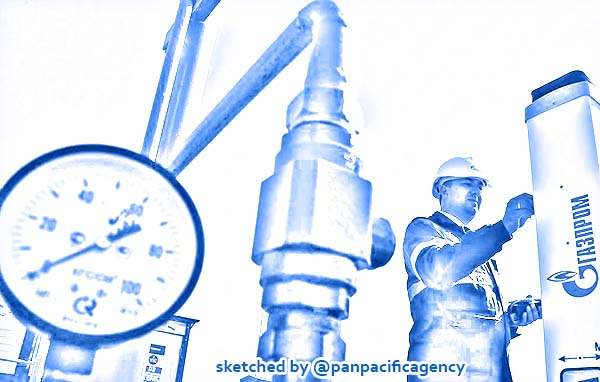[Analytics] Will Yemen’s first nationwide ceasefire in 7 years ease energy concerns in Asia?

© Yegor Aleyev/TASS. Sketched by the Pan Pacific Agency.
Efforts to extend the country’s first ceasefire for years, and create an opportunity to negotiate an end to the conflict, continue despite setbacks. Move signifies ‘the most significant step in a while to shake up a largely moribund political process in Yemen’ an adviser said. Tom Hussain specially for the South China Morning Post.
Yemen’s warring factions are holding back channel negotiations to extend the country’s first ceasefire in six years and develop a road map to end a seven-year conflict which has threatened the security of Asia’s oil supplies and export trades with Europe.
The ceasefire declaration on April 2 was followed on April 7 by the Saudi-orchestrated resignation of Yemen’s beleaguered president Abed Rabbo Mansour Hadi during a conference of political factions in Riyadh called by the Gulf Cooperation Council.
The GCC comprises Bahrain, Kuwait, Oman, Qatar, Saudi Arabia, and the United Arab Emirates.
Hadi transferred his powers to an eight-member presidential leadership council comprising representatives of disparate Yemeni groups opposed to the Houthis.
But participants at the Riyadh conference “had no idea” about the formation of the presidential leadership council “until it was announced following hours of closed-door discussions” between Saudi Crown Prince Mohammed bin Salman and “a small group of Yemeni politicians”, said Maysaa Shuja al-Deen, a senior expert at the Sanaa Centre for Strategic Studies.
“No one can realistically claim that ‘consultations’ resulted in this council,” she said, in an April 8 statement issued by the Yemeni think tank.
The Houthis, who are formally known as Ansar Ullah, rejected the formation of the council, which analysts said has been structured so as to allow the rebels to join it at a later stage.
Despite questions about the legitimacy of the council, its formation and the ceasefire “signify the most significant step in a while to shake up a largely moribund political process in Yemen,” said Adam Baron, an adviser on Yemen at the Centre for Humanitarian Dialogue, a private diplomacy organisation based in Switzerland.
“This could yield new opportunities,” he told This Week In Asia.
The new council, led by Hadi’s erstwhile chief of staff General Rashad al-Alimi, was sworn in on Tuesday at a symbolic gathering of Yemen’s parliament in the southern port city of Aden.
The success of the GCC push to end Yemen’s conflict will be determined by “conditions on the ground and a very strong international effort to help the Yemeni-to-Yemeni process by allowing the Houthis to begin to open up their ports”, said Theodore Karasik, a senior adviser at Gulf State Analytics, a Washington-based political risk consultancy.
With the Houthis continuing their military operations at a low tempo, “there is concern about what comes next”, he said.
“So there are Track-2 efforts ongoing now in the region to help soothe over the issues, and to get communications up and running,” Karasik told This Week In Asia. “It is an uphill battle.”
The ongoing backchannel talks are being hosted by influential members of the Yemeni diaspora in Oman and Turkey, he said.
Since intervening in Yemen’s civil war in 2015 to prevent the Houthis from seizing control of the entire country, the Saudi-led coalition has imposed an air and sea embargo of regions controlled by the rebels.
The Houthis have retaliated by mining parts of the Red Sea, including the Bab el-Mandeb strait which connects the Indian Ocean with the Mediterranean Sea via the Suez Canal.
The group has also deployed explosives-laden boats in waters off Saudi ports in the Red Sea.
“Any insecurity in Bab el-Mandab has fallout on global energy markets,” Baron said. “Therefore, any progress in the Yemeni peace process would likely have positive fallout on wider energy markets.”
A 34-nation naval task force led by the United States Navy’s Bahrain-based 5th Fleet on Sunday launched patrols in the Red Sea, which is the conduit of about 12 per cent of global maritime trade.
The Arabian Peninsula is the leading source of oil, petroleum products and liquefied natural gas for China, India, Japan and South Korea.
China’s only overseas naval base is located in Djibouti, a small African country with a coast on the Gulf of Aden which also provides logistical support centres to the navies of the US, Britain and five European powers.
Under the terms of the United Nations-mediated two-month ceasefire which took effect on April 2, ships carrying desperately needed fuel supplies have been allowed to dock at Houthi-controlled Red Sea ports in Hodeidah province.
An extension of the two-month ceasefire would also apply to the air war between Saudi Arabia and the United Arab Emirates, and the Houthi rebels, who are formally known as Ansar Ullah.
Since 2019, the Houthis have fired Iran-supplied ballistic missiles and explosives-laden drones at airports, civic infrastructure, and oil and gas facilities in Saudi Arabia, Asia’s biggest oil supplier.